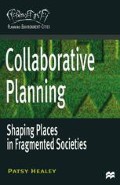Abstract
This chapter examines the concerns with local environmental qualities arising from the worlds of economic organisation and business life. A characteristic of western industrial capitalism has been the separation of economic life from everyday life, both in terms of time (work happens in factory or office time) and place (symbolised by the activity of going to work). In the context of western rationalism too, modern life has privileged material growth and technological development as a measure of welfare (see Ekins, 1986). Through the social technologies of skill development, company management and the development of the money form, and through engineering technologies, for transport and communications, and for labour saving devices, material resources have expanded around us, structuring our daily lives and our life strategies. These technologies have become systems which penetrate our ‘lifeworlds’. The philosophy of the pursuit of material improvement, encapsulated in the strive for continual economic growth, provides the ideological underpinning for the dominance of economic organisation and priorities in public policy.
Preview
Unable to display preview. Download preview PDF.
Author information
Authors and Affiliations
Copyright information
© 1997 Patsy Healey
About this chapter
Cite this chapter
Healey, P. (1997). Local Economies, Land and Property. In: Collaborative Planning. Planning Environment Cities. Palgrave, London. https://doi.org/10.1007/978-1-349-25538-2_5
Download citation
DOI: https://doi.org/10.1007/978-1-349-25538-2_5
Publisher Name: Palgrave, London
Print ISBN: 978-0-333-49574-2
Online ISBN: 978-1-349-25538-2
eBook Packages: Palgrave Political & Intern. Studies CollectionPolitical Science and International Studies (R0)

